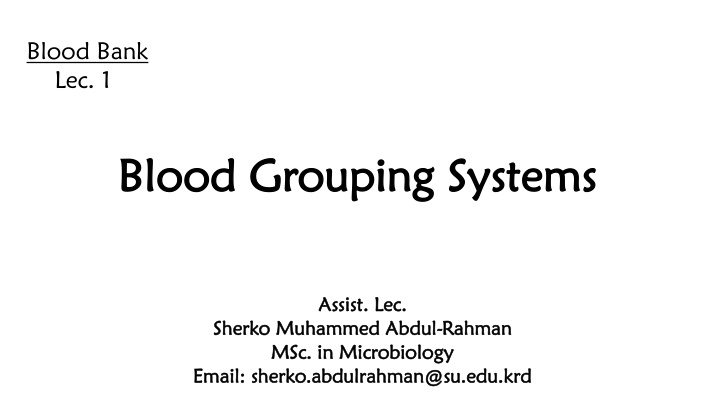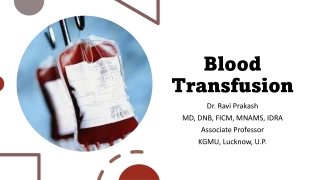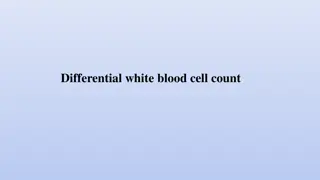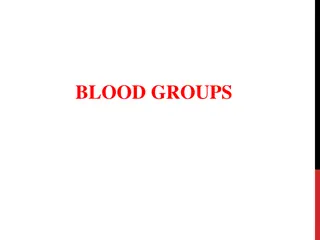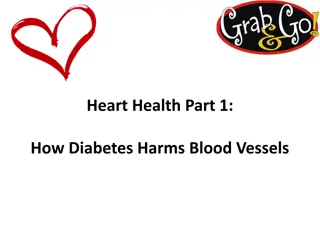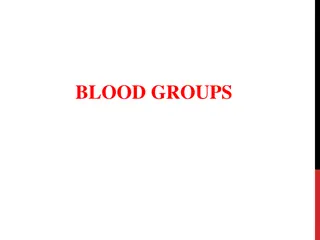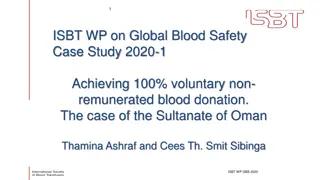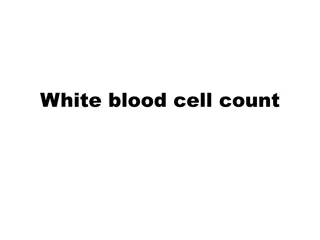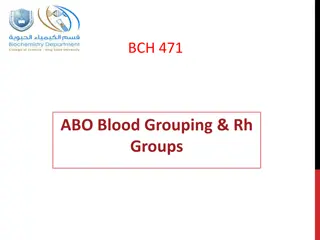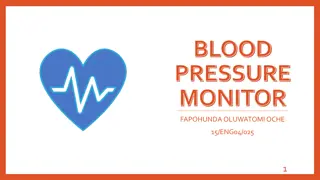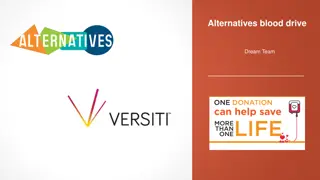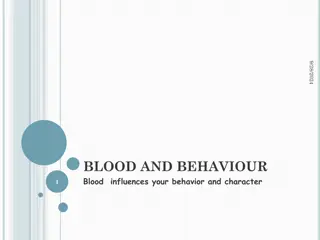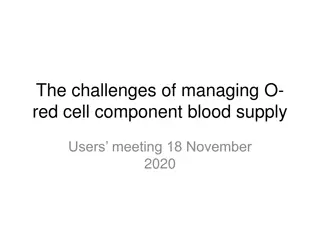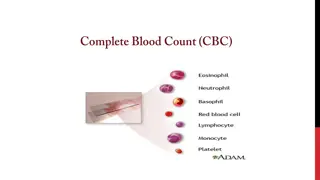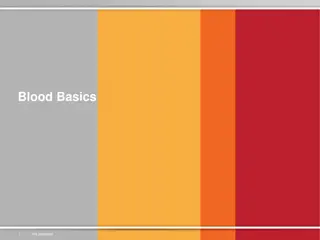Blood Grouping Systems and Types - Essential Information
Blood is a vital body fluid that carries nutrients, oxygen, and removes waste. Learn about the types of blood cells, blood grouping systems, and factors influencing blood type. Discover the significance of ABO and Rh blood groups, how bone marrow transplants can impact blood type, and the stability of blood types in individuals.
Download Presentation

Please find below an Image/Link to download the presentation.
The content on the website is provided AS IS for your information and personal use only. It may not be sold, licensed, or shared on other websites without obtaining consent from the author.If you encounter any issues during the download, it is possible that the publisher has removed the file from their server.
You are allowed to download the files provided on this website for personal or commercial use, subject to the condition that they are used lawfully. All files are the property of their respective owners.
The content on the website is provided AS IS for your information and personal use only. It may not be sold, licensed, or shared on other websites without obtaining consent from the author.
E N D
Presentation Transcript
Blood Bank Lec. 1 Blood Grouping Systems Blood Grouping Systems Assist. Assist. Lec Lec. . Sherko Muhammed Abdul Sherko Muhammed Abdul- -Rahman MSc. in Microbiology MSc. in Microbiology Email: Email: sherko.abdulrahman@su.edu.krd sherko.abdulrahman@su.edu.krd Rahman
What What is is Blood? Blood? Blood is a a body body fluid fluid in in humans humans and other other animals animals that delivers necessary substances such as nutrients nutrients and oxygen oxygen to the cells and transports metabolic metabolic waste waste products products away away from those same cells. 3/7/2025 2
What are the three types of blood? What are the three types of blood? Blood is made mostly of plasma, but 3 main types of blood cells circulate with the plasma: 1. 1. White blood cells, White blood cells, ward off infection 2. 2. Red blood cells, Red blood cells, carry oxygen. 3. 3. Platelets, Platelets, help the blood to clot. (clotting stops the blood from flowing out of the body when a vein or artery is broken). 3/7/2025 3
3/7/2025 4
3/7/2025 5
Blood Grouping Systems Blood Grouping Systems A blood type (also known as a blood presence and absence on the blood group absence of of red red blood blood cells group) is a classification of of antibodies antibodies and inherited cells (RBCs) (RBCs). . blood, based on the presence antigenic antigenic substances substances on inherited the surface surface of Several of these red blood cell surface antigens can stem from one allele and collectively form a blood group system. Blood types are inherited and represent contributions from both parents. The two most important blood group systems are ABO they determine someone's blood type (A, status) for suitability in blood transfusion. ABO and Rh +, RhD Rh; RhD A, B, B, AB AB, and O O, with +, 3/7/2025 6
Almost always, an individual has the same rarely an individual's blood type changes through addition of of an an antigen antigen in in infection infection, malignancy malignancy, or autoimmune Another more common cause of blood type change is a bone transplant transplant. Bone-marrow transplants are performed for many leukemias and lymphomas lymphomas, among other diseases. If a person receives bone marrow from someone who is a different ABO type (e.g., a type type A A patient receives a type blood type will eventually convert to the donor's type. same blood blood group group for life, but very addition or or suppression suppression autoimmune disease disease. bone marrow marrow leukemias type O O bone marrow), the patient's 3/7/2025 7
The ABO blood group system involves two red blood blood cells two antigens antigens (The antigens are two antibodies antibodies (The antibodies in present on the red the serum serum ), It found in human blood. The two antigens are antigen A and antigen B. The two antibodies are antibody A and antibody B. cells) and two Regarding the antigen property of the blood all human beings can be classified into 4 groups, those with antigen A (group A), those with antigen B (group B), those with both antigen A and B (group AB) and those with neither antigen (group O). 3/7/2025 8
3/7/2025 9
There is an agglutination reaction between similar antigen antibody antibody. Thus, transfusion can be considered safe as long as the serum of the recipient does not contain antibodies for the blood cell antigens of the donor. antigen and The antibodies present together with the antigens are found as follows: 1. Antigen A with antibody B 2. Antigen B with antibody A 3. Antigen AB has no antibodies 4. Antigen nil (group O) with antibody A and B 3/7/2025 10
Other Other blood blood group group systems systems As of 2019 2019, 36 blood group systems have been identified by the Society for for Blood Blood Transfusion Transfusion in addition to the ABO and Rh International International Society systems. Thus, in addition to the ABO antigens and Rh antigens, many other antigens are expressed on the RBC surface membrane. H-antigen Rhesus system MNS antigen system Lutheran system Kell system Duffy system Many of the blood group systems were named after the patients in whom the corresponding antibodies were initially encountered. 3/7/2025 11
Red Red blood blood cell cell compatibility compatibility Blood Blood group their RBCs, and their blood plasma does not contain any antibodies against either A or B antigen. Therefore, an individual with type AB blood can receive blood from any group, but cannot donate blood to any group other than AB. They are known as universal universal recipients recipients. . group AB AB individuals have both A A and B B antigens on the surface of 3/7/2025 12
Blood Blood group and blood Therefore, a group A individual can receive groups groups A A or or O O (with A being preferable), and can donate individuals with type A A or or AB AB. . group A A individuals have the A A antigen blood serum serum containing IgM antigen on the surface of their RBCs, IgM antibodies antibodies against the B antigen. receive blood blood only from individuals of donate blood blood to Blood Blood group and blood Therefore, a group B individual can receive groups groups B B or or O O (with B being preferable), and can donate individuals with type B B or or AB AB. . group B B individuals have the B B antigen blood serum serum containing IgM antigen on the surface of their RBCs, IgM antibodies antibodies against the A antigen. receive blood blood only from individuals of donate blood blood to 3/7/2025 13
Blood Blood group not have either blood blood serum serum contains IgM Therefore, a group O individual can receive individual, but can donate donate blood (i.e., A, A, B, B, O O or or AB AB). If a patient needs an urgent blood transfusion, and if the time taken to process the recipient's blood would cause a detrimental delay, O O negative blood blood can be issued. Because it is compatible with anyone, O negative blood is often overused and consequently is always in short supply. group O O (or blood either A A or blood group or B B antigens antigens on the surface of their RBCs, and their IgM anti anti- -A A and and anti anti- -B B antibodies antibodies. receive blood blood only from a group blood to individuals of any ABO blood group group zero zero in some countries) individuals do group O O negative 3/7/2025 14
3/7/2025 15
Plasma Plasma compatibility compatibility Blood plasma compatibility is the opposite of red blood cell compatibility. Type Type AB AB plasma carries neither anti-A nor anti anti- -B B antibodies and can be transfused to individuals of any blood group. Type Type AB AB patients can only receive receive type AB plasma. Type O carries both antibodies, so individuals of blood group O can plasma from any blood group, but type O plasma can be used receive receive plasma only by type O recipients. 3/7/2025 16
3/7/2025 17
